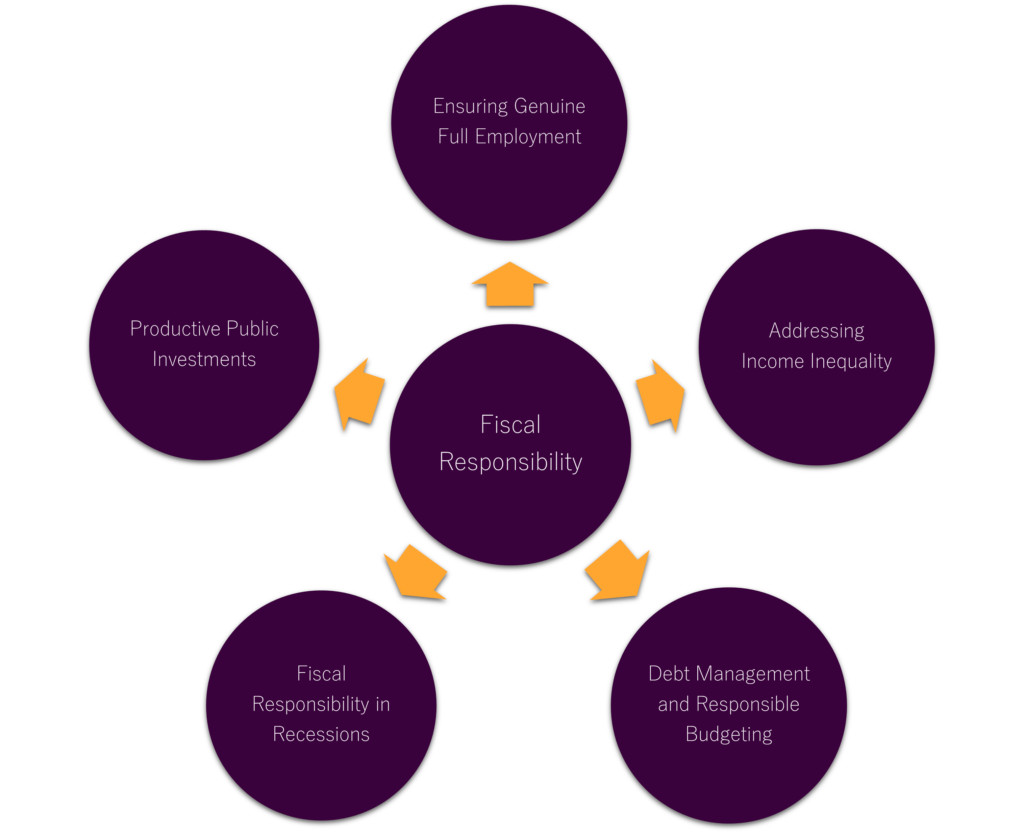The concept and practice of fiscal responsibility entail the judicious management of financial means, the maintenance of balanced budgets, the limitation of spending, and the pursuit of sustainable debt. It is a critical approach to managing financial resources, aligning these actions with foreseeable economic challenges, thus emphasizing its comprehensive nature.
Furthermore, Fiscal prudence extends beyond the mere reduction of deficits. It pertains equally to the attainment of full employment and the equitable dispersion of income through strategic fiscal policies. This approach involves a spectrum of financial strategies, ranging from the acquisition of sustainable revenues to the disciplined adherence to budgets, the establishment of financial milestones, and the fortification of fiscal safety nets. Additionally, it underscores the value of long-term investments while promoting responsible debt management. For individuals and organizations, embracing fiscal responsibility is also key to sustaining financial equilibrium, fostering economic advancement, and withstanding the impacts of recessions.
Econometrics Tutorials with Certificates
Understanding Fiscal Responsibility
Fiscal responsibility denotes the judicious management of financial assets, aiming for equilibrium in budgets, curtailed spending, and maintaining debt at sustainable levels. It rests on several core tenets: the importance of sustainable income, the necessity of adhering to a budget, the imperative of outlining financial objectives over both short and long horizons, the essentiality of an emergency fund, the need to dedicate a segment of earnings to investments, the crucial role of astute debt management and shunning over-borrowing. For individuals and entities alike, such practices are instrumental in attaining financial serenity and, therefore, fortitude against fiscal vicissitudes.
Definition of Fiscal Responsibility
Fiscal responsibility can also be defined as the careful handling of financial assets to maintain budgetary equilibrium, restrict spending, and hold debt at viable levels. Moreover, it embodies a holistic strategy that integrates revenue, budgeting, investing, and debt control to nurture lasting financial stability.

Key Principles of Fiscal Responsibility
The principles of fiscal responsibility encompass:
- Earning revenue/income in a sustainable way
- Having a well-defined budget and sticking to it
- Setting financial goals (both short-term and long-term)
- For individuals, building an emergency fund and also saving for the future
- Investing a portion of revenue
- Managing debt responsibly and avoiding excessive borrowing
These steadfast principles further empower governments, individuals and corporations to reach financial robustness, withstand financial shocks, and navigate economic downturns with resilience.
Why Fiscal Responsibility Matters
Fiscal responsibility plays a pivotal role in driving economic growth and stability while ensuring financial security. Effective management of public finances encourages further economic expansion by maintaining balanced budgets, limiting expenditures, and managing debt successfully. Doing so enhances trust from investors and consumers, crucial for enhancing private investment and consumer spending.
Impact on Economic Growth and Stability
At a macroeconomic scale, adopting fiscal responsibility is also instrumental in promoting economic growth and stability. Governments adhering to prudent financial strategies avoid budget deficits and financial crises, aiding in the preservation of taxes and fees at reasonable levels. Hence, this sustains an environment conducive to increased private-sector investments and consumer spending. Furthermore, maintaining balanced budgets allows for strategic investments in critical areas like education, public safety, and infrastructure, fortifying the groundwork for enduring prosperity.
Implications for Individuals and Households
On an individual and household scale, the practice of fiscal responsibility empowers people to establish emergency savings, reduce debt burdens, and also engage in future-oriented investments. This leads to enhanced financial resilience and a preparedness to navigate economic downturns. Through prudent budgeting and debt management, individuals and families can further bolster their financial security. Concurrently, they contribute to the wider economic stability achieved through fiscal prudence.
Ensuring Genuine Full Employment with Fiscal Responsibility
One key fiscal mandate is to guarantee authentic full employment. For instance, the U.S. has grappled with insufficient aggregate demand over the last two decades. This has caused unemployment rates to stay high, despite low interest rates. The lack of demand not only hindered income and job creation but also diminished the economy’s productive potential over time.
Chronic Demand Shortfalls and Unemployment
The negative impact of demand deficits and high unemployment on households urges fiscal policymakers to strive for true full employment. They must employ fiscal tactics to swiftly amend unemployment rates during economic downturns. The inadequacy of monetary approaches in bringing about rapid recession cessation also underscores the vital significance of expansionary fiscal measures to support full employment.
With expansionary fiscal policy to counter economic downturns, demographic groups encountering more unemployment typically experience larger unemployment rate drops. Simultaneously, groups with traditionally lower labour force participation see more substantial participation rate hikes. In tight labour markets, disparities in labour market outcomes between racial groups tend to reduce remarkably. Moreover, people with job-limiting disabilities often find more job opportunities in robust labour markets.
Addressing Income Inequality through Fiscal Responsibility
Fiscal responsibility, beyond ensuring full employment, also demands a focus on income inequality. Studies on its roots and effects, analyzing vast micro-data and historic trends across nations, continue to grow. Policies for redistribution impact households significantly, affecting welfare through monetary means like taxes and transfers, and non-monetary benefits such as free education and healthcare.
Fiscal Responsibility and Distribution of Income
Embracing fiscal responsibility means funding government outlays, even new grand initiatives, primarily via a progressive tax schema, not debt. Such a strategy, amalgamating expansive spending and equitable tax, can accelerate economic growth and better income dispersion. The metric for fiscal policy’s success should transcend mere deficit numbers, instead assessing its role in achieving full employment and fostering equity in the economy.
The Gini coefficient averages at 0.32 for OECD states, showing substantial income inequality. This disparity has widened, with a 1.7-percentage-point increase in the Gini coefficient since the 1990s. In a study on OECD nations, it was observed that fiscal policy diminishes income inequality by 22% with absolute certainty (Source: Exploring the Fiscal policy—income inequality relationship with Bayesian model averaging analysis). Notably, systems of progressive taxation, when coupled with redistributive measures, stand out for curbing income inequality.
The top 10% of the world’s earners capture over half of global income, while the bottom half garners just 8.5%. Ordinarily, a top decile individual receives €87,200 yearly, contrasting with a €2,800 annual income for someone from the lower bracket. Such stark disparities determine access to essential needs, like sustenance, health, learning, and shelter, and hence, shaping life outcomes for families worldwide.
Fiscal responsibility and Budgeting
Fiscal responsibility mandates astute budgeting to maintain equilibrium, ensure sound spending, and curb debt. Additionally, this requires a meticulous balance between inflows and outflows. It prioritizes essential, value-adding expenditures and also steering clear of the superfluous.
Managing debt wisely involves efforts towards diminishing the debt-to-GDP ratio. This strategy, therefore, hinges on fiscal prudence aligned with robust economic expansion.
Balancing Revenues and Expenditures
Furthermore, the crux of fiscal responsibility lies in crafting a well-balanced budget. Achieving this necessitates the synchronization of revenue and spending. The aim is to secure ample revenue via a just tax scheme and then allocate it toward viable, growth-enhancing expenditures.
Such measures bolster both the economic and societal fabric. They underpin a nation’s fiscal health through calculated spending on priority sectors.
Responsible Spending and Debt Management
Central to fiscal diligence are judicious spending and measured debt control. That is, frivolous state expenditures must be eschewed, with a focus on investments with tangible economic and social benefits. Regarding debt, the objective is to gradually diminish its proportion to GDP over a span of time.
This approach melds fiscal austerity with targeted outlays designed to carve a pathway to sustainable growth.
Nonetheless, not all financial disbursements should solely rest on tax revenues. In times of economic downturn, leveraging debt for stimuli can jump-start recovery effectively. Furthermore, public investments yielding robust economic and social dividends could responsibly lean on debt financing.
Yet, the critical tenet is ensuring that any debt-incurred spending conforms to the ethos of fiscal responsibility. That is, it should contribute substantially to a fiscally viable future.
Fiscal Responsibility in Recessions
Fiscal responsibility mandates the astute deployment of fiscal policy to address recessions and, thus, advance economic resurgence. In times of economic contraction, policies aimed at countering such trends compel governments to ramp up spending and enact tax reductions. These measures effectively elevate overall demand and enhance job creation.
Counter-cyclical Fiscal Policy
Efforts to reduce the debt-to-GDP ratio hold intrinsic merit over the long haul. However, it’s vital the pursuit of such objectives doesn’t eclipse addressing the immediate exigencies like demand shortages and surging unemployment amid recessions. Policymakers must deftly balance the imperative for fiscal prudence with the deployment of counter-cyclical, debt-fueled strategies vital for bolstering economic recuperation and stability. This implies that policymakers can use deficit budgets and debt responsibly during economic downturns. On the other hand, during periods of economic booms, policymakers can employ surplus budgets and bring down the debt.
Debt-financed Stimulus Measures
In the context of profound recessions, the presence of low interest rates alone fails to catalyze a recovery. This scenario underpins the necessity for a persistent expansionary fiscal policy until the realization of substantive full employment. Subsequent fiscal strategies need to ensure lasting full employment to combat chronic joblessness and further propel belated economic upturns. Hence, flinching from deficits excessively can shackle policymakers, impelling them into inaction against recessions and bolstering income disparagement.
Fiscal Responsibility and Public Investment
Engaging in fiscal responsibility demands not only the management of the public debt but also the strategic financing of productive ventures. Economic and social returns must be considered. Utilizing debt financing for ventures elevating the economy’s prowess and societal welfare is critical.
Essential investments like infrastructure, education, R&D, and green energy should be prioritized. The growth in economic activity and the broadening of the tax base over time are also pivotal outcomes. These investments, by surpassing their debt service costs, justify responsible debt, irrespective of the economic cycle.
A delicate equilibrium between fiscal discipline and leveraging debt for valuable public investments is imperative. As a result, it fortifies the groundwork for enduring prosperity.
Financing Productive Public Investments
The meticulous financing of impactful public projects, and the considerable economic and social returns they yield, lie at the crux of fiscal responsibility. While mitigating the debt over time is crucial, it shouldn’t hinder the strategic deployment of debts for ventures that elevate the economy and societal well-being.
Investments in infrastructure, education, innovation, and sustainable energy highlight this strategy. The subsequent economic surges and the broader tax base they foster typically outweigh the debt service costs. This warrants the judicious use of debt, even during stable economic periods.
It is a fine line that policymakers must walk, ensuring both fiscal prudence and the advancement of high-impact public projects. Such an approach underpins long-term growth and prosperity.
Achieving Fiscal Sustainability
At its core, the imperative of fiscal responsibility is to usher in a phase of enduring fiscal sustainability. This aspirational goal entails the gradual diminution of the debt-to-GDP ratio. Such progress is contingent upon several vital pillars. These include fostering economic growth, exercising judicious spending, and structuring a tax regime that both ensures adequate revenue and is uniformly fair.
Gradual Debt Reduction
The strategy for debt reduction mandates a deliberate, step-by-step approach. Swift deleveraging poses the risk of impeding economic resurgence and developmental momentum. For example, in the U.S., current debt trajectories underscored a worrisome projection. Without substantial policy shifts, the burden of federal debt borne by the public in relation to the national earnings stands to escalate significantly, and this trajectory forewarns of looming repercussions. Such effects include compounded government debt proportions against the economic backdrop. This, in turn, could precipitate elevated interest benchmarks, potentially stymying investments as well as curbing advancements in productivity.
Responsible Tax Policy
In the broader context, principled tax architecture, which encompasses progressive tax structures, emerges as a linchpin to sustainably funding governmental outlays. At the same time, it is instrumental in the concerted effort to diminish deficits and cultivate greater socioeconomic parity, all while ensuring the vitality of economic spheres remains intact. Striking a harmonious equilibrium in tax policies—one that is rooted in the principles of egalitarian wealth distribution and drives towards maximum employment and equitable income—positions the economic framework on a trajectory primed for enduring fiscal health. This, in essence, translates to enhanced prosperity for every member of society.
Fiscal Responsibility for Individuals and Households
Ensuring fiscal responsibility at the micro level necessitates meticulous financial planning and discipline. It mandates the establishment of clear financial goals, spanning short-term and long-term aspirations. Crafting a budget to judiciously distribute financial assets is fundamental in this endeavour.
Setting Financial Goals
The foundation of fiscal diligence lies in preparing for unforeseen events, saving for retirment, and handling debt and credit prudently. This entails refraining from excessive loans, settling credit card debts monthly, and reducing interest obligations. Such commitments are pivotal for fiscal soundness.
Building a Budget
Debt management and budgeting are linchpins for ensuring personal and familial financial security and resilience. Their efficacy extends to bolstering economic stability on a broader scale, underpinned by fiscal responsibility.
Managing Debt and Credit
Exemplifying wise debt management, it is critical to oversee debts with prudence, ensuring their affordability and reducing associated expenses. This approach averts common financial risks, such as recurring debt cycles and other fiscal hardships.
Conclusion
In conclusion, the concept of fiscal responsibility forms a vital component of the economic strategy both at large and small scales. At the level of countries, it entails careful handling of public resources to ensure financial stability via balanced budgets and minimal debt. These efforts are geared towards achieving broad socioeconomic objectives such as full employment and fair distribution of wealth.
At the personal and family level, fiscal responsibility translates into meticulous financial planning, budgeting, debt control, and wise investment of savings. This approach aims to create a ripple effect, spurring stability, fairness, and economic dynamism that bears fruit for all members of society.
Looking forward, it’s clear that functioning frameworks of fiscal rules can greatly boost economic and social resilience. These rules should be crafted to last, attracting confidence from both financial markets and the public. By persisting on a path that values employment, equal income, and strategic public spending, leaders can secure a prosperous future for their nations, benefiting every individual’s quality of life.
Econometrics Tutorials with Certificates
This website contains affiliate links. When you make a purchase through these links, we may earn a commission at no additional cost to you.


